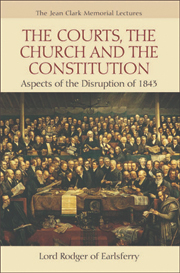Lecture 3 - The Long Shadow of the Disruption
Published online by Cambridge University Press: 05 August 2013
Summary
In 1994 the Church of Scotland Board of National Mission appointed the Rev. Helen Percy to the position of associate minister in a parish with such an impossibly long name that the editor of Session Cases wisely just describes it as being ‘in Angus’. The Board can little have thought that, by appointing her, they were starting a process that was eventually to take the Church of Scotland on its first foray into the House of Lords since 1842. Given the result, several more generations may rise and fall before the Church ventures there again. What matters for present purposes is not so much that the Church lost but why it lost. It advanced an argument that the civil courts, including the House of Lords, had no jurisdiction to entertain the case – and it lost that argument.
The basic facts are straightforward. Ms Percy was unmarried. In 1997, during her tenure of the office of associate minister, an allegation of improper sexual conduct was made against her. Although her first reaction was to resign her post, she subsequently took legal advice and decided to withdraw her resignation. The Board of National Mission agreed to reinstate her, but suspended her on full pay pending an investigation by the presbytery of Angus into the complaint against her. Some months later, after a process of mediation, the presbytery accepted her offer to demit her status as a minister.
- Type
- Chapter
- Information
- The Courts, the Church and the ConstitutionAspects of the Disruption of 1843, pp. 91 - 137Publisher: Edinburgh University PressPrint publication year: 2008

